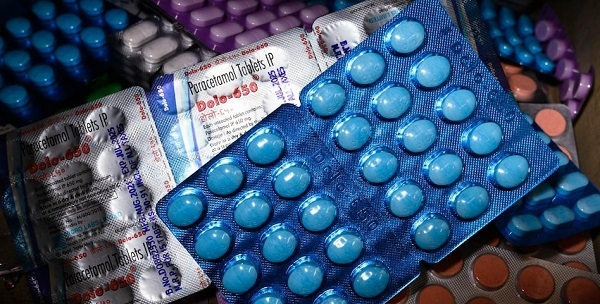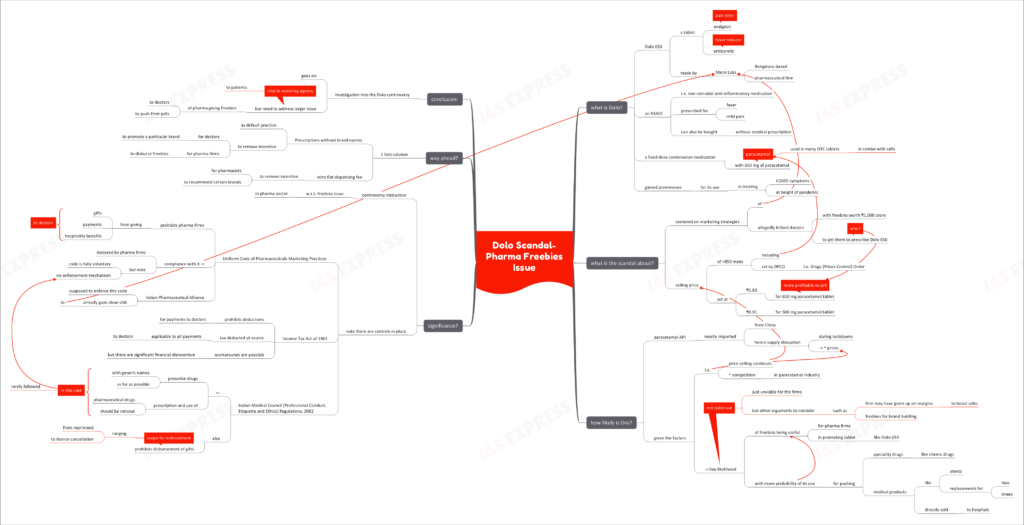Dolo Scandal- Pharma Freebies Issue

From Current Affairs Notes for UPSC » Editorials & In-depths » This topic
IAS EXPRESS Vs UPSC Prelims 2024: 85+ questions reflected
What is Dolo?
- Dolo 650 is an analgesic (pain killer) and antipyretic (fever reducing) tablet manufactured by Micro Labs, a Bengaluru-based pharmaceutical firm.
- This trademarked product is a fixed dose combination medication with 650 mg of an active compound called paracetamol. Majority of the OTC (over the counter) medicines contain paracetamol, in addition to salt.
- This NSAID (non-steroidal anti-inflammatory medication) is prescribed for fever and mild pains. It is even sold without a medical prescription.
- This tablet especially gained prominence for its use in treating COVID-19 symptoms at the height of the pandemic.

What is the scandal about?
- The controversy is centered on Micro Labs’ marketing strategies. The pharma firm is alleged to have bribed doctors, into promoting Dolo 650, with freebies worth ₹1,000 crore.
- The ceiling prices of more than 850 medicines, including paracetamol combinations, has been established by the DPCO (Drugs (Prices Control) Order). In case of 650 mg paracetamol tablet, the ceiling price is ₹1.83, while for 500 mg paracetamol tablet, it is ₹0.91.
- Hence, the sale of the 650 mg version is more profitable for the manufacturer.
How likely are freebies?
- Indian manufacturers mostly import paracetamol API from China. The pandemic and the lockdowns disrupted the regular supply from our northern neighbour, resulting in significant increase in prices.
- Combining this upward pricing pressure with the fact that DPCO continues to impose price ceilings and the high level of competition in the market shows that investing in freebies is an unprofitable venture for pharma firms.
- This doesn’t categorically rule out the recent allegations nor does it mean that the issue of freebies doesn’t exist.
- However, it shows that the freebie supply chain would be easier to manage in case of speciality drugs (eg: chemotherapy drugs) or when medical products like stents, knee and hip replacements are directly sold to the hospitals. In case of paracetamol, the situation created by the pricing caps and the high competition, tracking its prescription and rewarding doctors is unviable.
- Apart from this, other angles have been argued- that Micro Labs may have been willing to take lower margins to boost sales or that the freebies was a brand-building exercise towards higher sales, etc.- but, the truth is yet to out.
Why is it significant then?
- Meanwhile, examination of the controversy is instructive with regards to the issue of freebies in the larger pharma sector.
- The Uniform Code of Pharmaceuticals Marketing Practices prohibits pharma firms from giving gifts/ payments/ hospitality benefits to doctors.
- While the firms have been declaring their compliance with this code since 2015, it is noteworthy that adherence to this code is fully voluntary and there is no enforcement mechanism.
- The Indian Pharmaceutical Alliance, envisioned to ‘enforce’ the code, has already given a clean chit to Micro Labs in this present case.
- Another limiting influence is from the Income Tax Act of 1961:
- It explicitly prohibits deductions for payments to doctors.
- TDS or tax deducted at source is applicable to all payments to doctors.
- While workarounds are possible, there is a significant financial disincentive for pharma companies.
- The Indian Medical Council (Professional Conduct, Etiquette and Ethics) Regulations, 2002 also has something to say on this issue:
- Physicians are to prescribe drugs with generic names as far as possible.
- The prescription and use of pharmaceutical drugs should be rational.
- However, these norms are rarely followed and there isn’t any enforcement either.
- It prohibits disbursement of gifts. In this case at least, there is scope for enforcement- ranging from a reprimand to even cancellation of license.
What is the way ahead?
The solution to this issue of freebies in pharma sector is 2 fold:
- Prescriptions without brand names to be made the default practice- to remove incentive for doctors to promote a particular brand and for the pharma firms to disburse freebies to doctors.
- Introduction of flat dispensing fee (irrespective of maximum retail price)- to remove incentives for pharmacists to recommend certain brands.
Conclusion:
While investigation into the Dolo controversy goes on, the larger issue of pharma firms giving out freebies to doctors to push their products need to be addressed. It is vital in restoring agency to the patients.
Practice Question for Mains:
Examine the issue of pharma firms giving out freebies to doctors with reference to the Dolo controversy. (250 words)
If you like this post, please share your feedback in the comments section below so that we will upload more posts like this.

